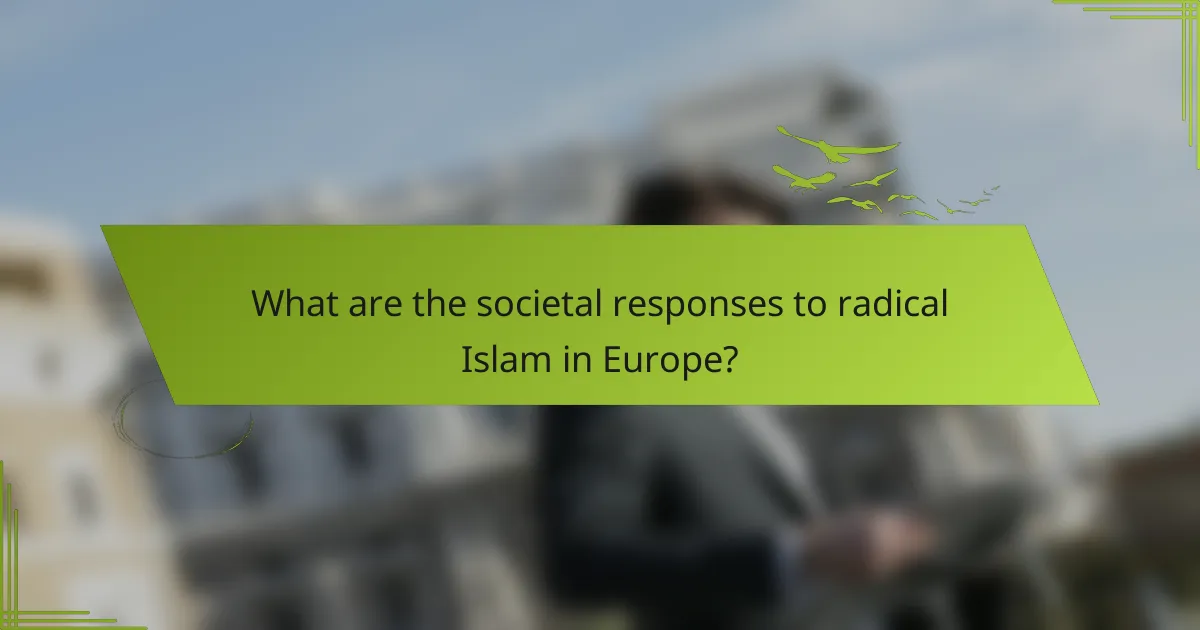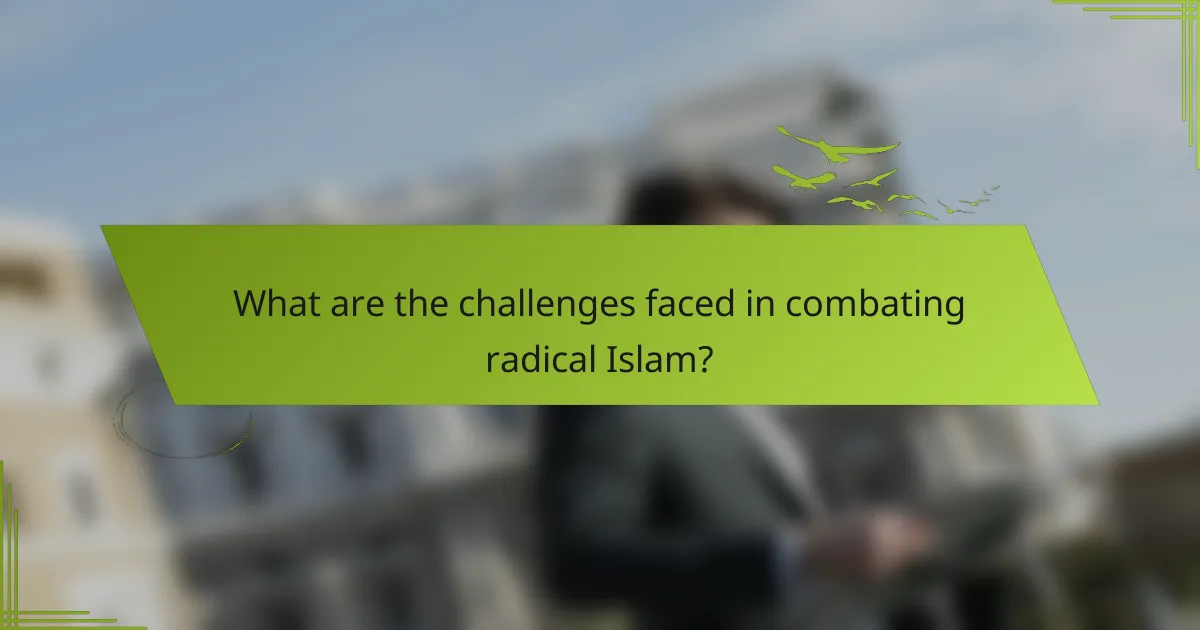Societal responses to radical Islam in Europe are shaped by a diverse array of historical, cultural, and political factors, leading to varying approaches across different countries. While some nations emphasize community engagement and preventive measures, others lean towards legislative and security-focused strategies. This complexity is further compounded by challenges such as social integration, funding limitations for preventive initiatives, and public resistance to government actions.

What are the societal responses to radical Islam in Europe?
Societal responses to radical Islam in Europe vary significantly by country, reflecting different historical, cultural, and political contexts. These responses include government policies, community initiatives, counter-radicalization programs, public opinion, and media portrayal, each playing a crucial role in shaping the overall approach to this complex issue.
Government policies in France
France has implemented strict government policies aimed at combating radical Islam, particularly following high-profile terrorist attacks. The government has increased surveillance, closed mosques deemed radical, and enacted laws to regulate religious practices, emphasizing secularism.
Additionally, France has invested in intelligence and law enforcement resources to monitor potential threats. These measures have sparked debates about civil liberties and the balance between security and freedom of expression.
Community initiatives in the UK
The UK has focused on community-led initiatives to counter radical Islam, emphasizing engagement and dialogue. Programs like “Prevent” aim to identify and support individuals at risk of radicalization through local partnerships and outreach efforts.
These initiatives often involve collaboration with community leaders, schools, and social services to create a supportive environment that discourages extremism. However, they face challenges related to trust and perceptions of government motives.
Counter-radicalization programs in Germany
Germany has developed various counter-radicalization programs that focus on education and integration. These programs often target young people and aim to provide alternative narratives to extremist ideologies through workshops and mentorship.
Moreover, Germany emphasizes the importance of community involvement in these initiatives, encouraging local organizations to participate actively. This approach seeks to build resilience against radicalization by fostering social cohesion.
Public opinion in the Netherlands
Public opinion in the Netherlands regarding radical Islam is mixed, with significant concern about security and integration. Many citizens support strong measures against extremism but also advocate for the protection of civil rights and freedoms.
Surveys indicate that while there is a desire for effective government action, there is also a strong sentiment against stigmatizing Muslim communities, highlighting the need for balanced approaches that address both safety and inclusivity.
Media portrayal in Spain
In Spain, media portrayal of radical Islam has evolved, particularly following the 2004 Madrid train bombings. Coverage often emphasizes the distinction between the broader Muslim community and extremist elements, aiming to prevent generalizations.
However, sensationalist reporting can sometimes perpetuate stereotypes, leading to public fear. Media outlets are increasingly aware of their role in shaping narratives and are working towards more responsible reporting practices that reflect the complexities of the issue.

How do different countries approach radical Islam?
Countries vary significantly in their approaches to radical Islam, influenced by historical, cultural, and political factors. Some prioritize community engagement and prevention, while others focus on legislative measures and security responses.
Comparative analysis of France and Germany
France and Germany have adopted different strategies in addressing radical Islam. France emphasizes a strong secular approach, implementing strict laws against hate speech and promoting secularism in public life. This includes measures like banning religious symbols in schools and public spaces.
In contrast, Germany focuses on integration and community dialogue. The government has invested in programs aimed at fostering social cohesion and preventing radicalization through educational initiatives and community outreach. This approach seeks to address the underlying issues that may lead to radicalization.
UK’s community engagement strategies
The UK employs community engagement strategies to combat radical Islam, primarily through the Prevent program. This initiative aims to identify individuals at risk of radicalization and provide support to steer them away from extremist ideologies.
Local authorities collaborate with community organizations to create safe spaces for dialogue and education. These efforts include workshops and outreach programs that promote inclusivity and understanding among diverse communities, helping to build resilience against radical narratives.
Italy’s legislative responses
Italy has taken a legislative approach to address radical Islam, focusing on laws that enhance security and counter-terrorism measures. The Italian government has enacted laws that allow for the monitoring of suspected individuals and organizations linked to extremist activities.
Additionally, Italy emphasizes international cooperation, working with other European nations to share intelligence and best practices. This collaborative effort aims to strengthen the overall response to radicalization and enhance public safety.

What are the challenges faced in combating radical Islam?
Combating radical Islam presents significant challenges, including social integration, funding constraints for preventive programs, and public resistance to government interventions. Each of these factors complicates efforts to address the root causes of radicalization and implement effective countermeasures.
Social integration issues in Belgium
Belgium faces notable social integration challenges that contribute to radical Islam. The country has a diverse population, but significant segments, particularly in urban areas, experience isolation and disenfranchisement. This alienation can foster environments where extremist ideologies take root.
Efforts to improve social cohesion have included community outreach programs and educational initiatives, yet progress remains slow. Addressing language barriers and promoting intercultural dialogue are essential steps to enhance integration and reduce susceptibility to radicalization.
Funding limitations for programs in Sweden
In Sweden, funding limitations hinder the effectiveness of programs aimed at preventing radical Islam. While the government allocates resources for counter-radicalization initiatives, budget constraints often restrict the scope and reach of these programs. This can lead to gaps in support for at-risk communities.
To maximize impact, Sweden could consider reallocating existing funds or seeking partnerships with non-governmental organizations. Investing in local community projects that promote inclusivity and resilience against extremist narratives is crucial for long-term success.
Public resistance to government measures in Austria
Public resistance to government measures in Austria complicates the fight against radical Islam. Many citizens express concerns about privacy and civil liberties, leading to pushback against surveillance and preventive policies. This resistance can undermine the effectiveness of necessary security measures.
To address these concerns, the government should prioritize transparency and community engagement. Building trust through open dialogue and involving local leaders in decision-making can help mitigate resistance and foster a collaborative approach to countering radicalization.

What role does education play in addressing radical Islam?
Education plays a crucial role in addressing radical Islam by promoting critical thinking, tolerance, and understanding of diverse cultures. By implementing effective educational strategies, societies can counteract extremist ideologies and foster a more inclusive environment.
Curriculum changes in France
In France, curriculum changes have focused on integrating secular values and promoting citizenship education. Schools emphasize the importance of laïcité, or secularism, which aims to separate religion from public life and foster a sense of national identity.
Additionally, educational programs include discussions on the principles of democracy and human rights, encouraging students to engage critically with various ideologies. This approach helps to build resilience against radical narratives by fostering an understanding of social cohesion and mutual respect.
Awareness programs in Denmark
Denmark has implemented awareness programs aimed at educating communities about the dangers of radicalization. These initiatives often involve collaboration between schools, local authorities, and community organizations to provide resources and support for at-risk youth.
Programs typically include workshops and seminars that focus on media literacy, enabling individuals to critically assess information and resist extremist propaganda. By fostering open dialogue and promoting inclusivity, Denmark aims to mitigate the appeal of radical ideologies among its youth.

How effective are counter-radicalization strategies?
Counter-radicalization strategies can be effective in reducing the appeal of extremist ideologies, but their success varies significantly across different contexts and implementations. Key factors include community engagement, education, and the adaptability of programs to local needs.
Success stories from the UK
The UK has seen notable success with its counter-radicalization program, Prevent, which aims to intervene early with individuals at risk of radicalization. By focusing on community partnerships and providing support services, the program has reportedly helped divert numerous individuals from extremist paths.
One effective approach has been the integration of local community leaders in the process, allowing for tailored interventions that resonate with specific cultural contexts. This grassroots involvement has fostered trust and cooperation, enhancing the program’s overall impact.
Failures in implementation in Belgium
In Belgium, counter-radicalization efforts have faced significant challenges, leading to mixed outcomes. A lack of coordination among various government agencies has hampered the effectiveness of initiatives, resulting in fragmented responses to radicalization.
Additionally, the focus on punitive measures rather than preventive strategies has alienated communities, making it difficult to build the necessary trust for effective intervention. This has underscored the importance of a holistic approach that prioritizes community engagement and support over enforcement alone.

What are the future trends in societal responses to radical Islam?
Future trends in societal responses to radical Islam are likely to focus on community engagement, counter-narratives, and enhanced security measures. As societies grapple with the implications of radical ideologies, they will increasingly adopt multi-faceted approaches that balance security with social cohesion.
Increased Community Engagement
One significant trend is the emphasis on community engagement to counter radicalization. Local governments and organizations are likely to foster partnerships with community leaders to promote dialogue and understanding. Initiatives may include workshops, educational programs, and cultural exchanges aimed at building trust and resilience against extremist ideologies.
For example, cities in Europe have implemented community policing strategies that involve local residents in safety discussions, which can help identify and address grievances before they escalate into radicalization. These efforts can create a sense of belonging and deter individuals from seeking extremist solutions.
Development of Counter-Narratives
Another trend is the development of effective counter-narratives to challenge radical ideologies. Governments and NGOs are expected to invest in campaigns that highlight the negative impacts of extremism and promote alternative viewpoints. This can involve leveraging social media platforms to reach younger audiences who are more susceptible to radical messaging.
Successful counter-narrative campaigns often feature personal stories from former extremists or community members who advocate for peace. These narratives can resonate more deeply than traditional messaging, making them a powerful tool in the fight against radical Islam.
Enhanced Security Measures
As the threat of radical Islam persists, enhanced security measures will likely remain a key response. This includes increased surveillance, intelligence sharing, and the use of technology to monitor potential threats. However, it is crucial that these measures are implemented in a manner that respects civil liberties.
For instance, countries may adopt regulations that balance security needs with privacy rights, ensuring that surveillance practices do not disproportionately target specific communities. Training law enforcement to engage with communities respectfully can also mitigate tensions that arise from security operations.
